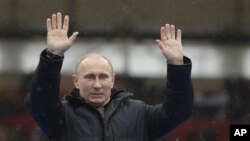Russians go to the polls on Sunday to choose a new president, widely predicted to be former president and current Prime Minister, Vladimir Putin.
The presidential balloting takes place after months of anti-Putin demonstrations, the latest last week when tens of thousands of Moscow residents joined hands to form a human chain of protesters around the Kremlin chanting slogans against what many of them see as a rigged vote to assure Mr. Putin’s rule for the next 12 years.
The anti-Putin anger began last September after he announced he would run in this weekend’s election to swap jobs with the current President, Dmitry Medvedev. According to Robert Legvold, a Russia scholar at Columbia University in New York, large segments of the opposition simply concluded, We’ve had enough, or as the Russians would say, ‘we’ve had it up to our eyeballs.'
That anger boiled into street protests in Moscow and Russia’s other major cities after last December’s parliamentary elections, which opposition factions felt were riddled with widespread vote fraud.
But despite the anger and protests - and even though the anti-Putin opposition is split between four other presidential candidates - experts on Russia predict Mr. Putin will not only dominate Sunday’s balloting, but get enough votes to avoid a run-off.
"There seems to be little doubt right now that Putin will gather more than half of the votes and will win in the first round," Sergei Glebov, a Russia expert at Smith College in Massachusetts told VOA in an interview. Glebov added, however, that a run-off could not be ruled out if the anti-Putin opposition could mobilize its forces and concentrate their efforts.
Legvold agrees, but adds that Mr. Putin will be harmed no matter which way the vote goes on Sunday.
"If, on the one hand, he wins in the first round, doesn’t have to go to a second round, then among the large segment of the public that already voted in December and have been out in the streets, they are going to see this as a manipulated election," said Legvold.
On the other hand, if it’s forced into a second round, he’s got a negative vote on his leadership - even if he carries the second round.
In either case, Legvold said Putin will go into the presidency much weaker than during his previous stint in the job from 2000 to 2008.
U.S. officials have been closely monitoring Russia’s presidential run-up, especially since Putin has been using a familiar tool during his campaign.
"He has really resorted to a tactic that, of course, has been used since he became president in 2000 - and that is to invoke the United States [as the] enemy, to blame the United States for a lot of Russian problems," said Angela Stent, a Russia specialist at Georgetown University in Washington D.C.
"As you saw in the Duma [parliamentary] elections, he then blamed Hillary Clinton, Secretary [of State] Clinton, for supporting the opposition and for trying to undermine Russian stability," she said.
Glebov of Smith College says much of Mr. Putin’s anti-American rhetoric is "designed for domestic consumption more than international politics." Glebov warns, however, that the Putin rhetoric does have serious foreign policy implications.
"Putin appears as a politician who, at least in part, is driven by the desire to limit the power and the influence of the United States, and appears as the obstacle on the path of American - imaginary or real - expansion and power," Glebov said.
Despite this, both Glebov and Legvold expect continuity in U.S.-Russia relations when Prime Minister Putin takes over the presidency from Medvedev.
"It’s not to say that Putin doesn’t have a grimmer view, a more suspicious view, of the U.S. than Medvedev did," Legvold said. "But on most of the key issues - cooperation on Afghanistan, whatever kind of arms control we did or didn’t achieve with [the] New START [nuclear non-proliferation treaty], whatever progress we may or may not achieve on missile defense - I don’t think that Putin is out of step with Medvedev."
Another point most Russia experts agree on is that the relationship between Washington and Moscow has developed so much over the past two decades that a return to the tension-filled days of the Cold War is virtually impossible.




